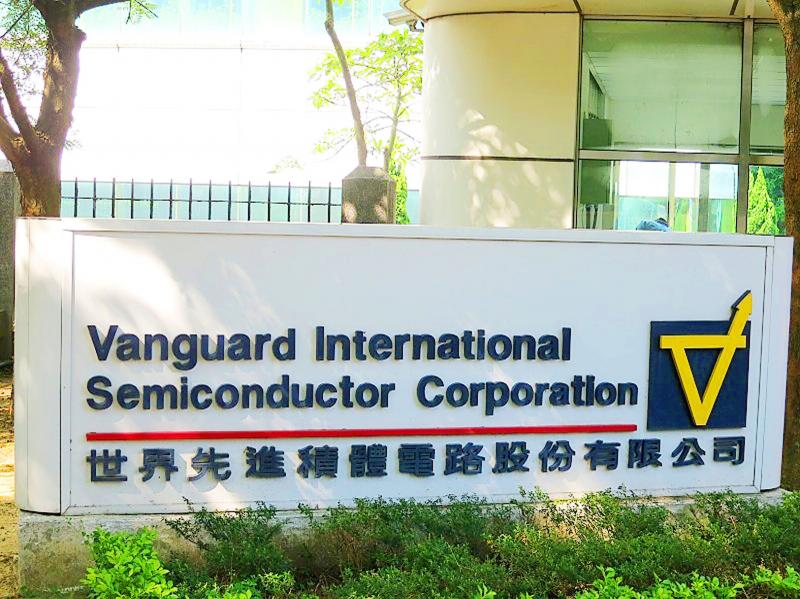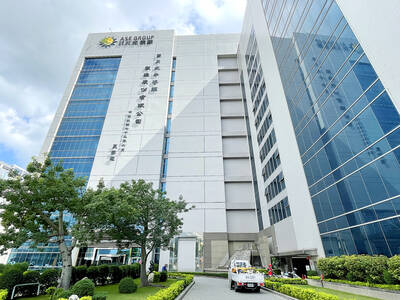Vanguard International Semiconductor Co (VIS, 世界先進) on Saturday said that its revenue and earnings for this year are expected to continue growing, after its performance in the first eight months of the year met expectations.
Hsinchu-based Vanguard is a specialty IC foundry service provider, specializing in LCD driver ICs and logic ICs, as well as power management ICs and complementary metal-oxide semiconductor image sensors.
In the first eight months, Vanguard’s accumulated revenue rose 15.09 percent year-on-year to NT$18.78 billion (US$636.16 million), company data showed.

Photo: Hung Yu-fang, Taipei Times
At a family day event for company employees in the Leofoo Village Theme Park (六福村) in Hsinchu County on Saturday, Vanguard chairman Fang Leuh (方略) said that the company was grateful to be able to hold the event, as many families and individuals have been affected by the COVID-19 pandemic worldwide.
As the outbreak in Taiwan is under control and the semiconductor industry is relatively unaffected by COVID-19, the company’s business can continue growing, the Chinese-language Liberty Times (the Taipei Times’ sister newspaper) quoted Fang as saying.
Fang said he expects the industry’s outlook in the second half of the year to be better than the first half, and because of strong demand for 8-inch wafers, supply constraints would persist through next year.
“As smartphones enter the 5G era this year, the semiconductor volume is twice that of 4G, resulting in increased demand for 8-inch power management ICs, metal-oxide-semiconductor field-effect-transistors and discrete components,” he said.
“Due to the outbreak, the work-from-home and distance-learning trends have also led to increased demand for high-end laptops and TVs... In the short term, the 8-inch wafers for power management ICs and driver ICs will remain in short supply,” Fang said.
Vanguard operates three 8-inch fabs in Taiwan and acquired an 8-inch fab in Singapore from US-based GlobalFoundries Inc early this year to resolve capacity constraints.
As 8-inch wafer demand remains robust, the company is looking at ways to expand capacity to meet clients’ demand, including installing more machines or acquiring existing fabs, Fang said.
As for the company’s investments in gallium nitride semiconductor technology, which is used in power supply applications, he said that Vanguard has delivered its first samples to clients, but it would take some time to start mass production.
Nevertheless, uncertainties still lie ahead, including the economic fallout of the pandemic, the development of effective vaccines and the US-China trade frictions, all of which warrant caution regarding the semiconductor industry, he added.

EXPANSION: The investment came as ASE in July told investors it would accelerate capacity growth to mitigate supply issues, and would boost spending by 16 percent ASE Technology Holding Co (ASE, 日月光投控), the world’s biggest chip assembly and testing service provider, yesterday said it is investing NT$17.6 billion (US$578.6 million) to build a new advanced chip packaging facility in Kaohsiung to cope with fast-growing demand from artificial intelligence (AI), high-performance-computing (HPC) and automotive applications. The new fab, called K18B, is to commence operation in the first quarter of 2028, offering chip-on-wafer-on-substrate (CoWoS) chip packaging and final testing services, ASE said in a statement. The fab is to create 2,000 new jobs upon its completion, ASE said. A wide spectrum of system-level chip packaging technologies would be available at

Taiwan’s foreign exchange reserves hit a record high at the end of last month, surpassing the US$600 billion mark for the first time, the central bank said yesterday. Last month, the country’s foreign exchange reserves rose US$5.51 billion from a month earlier to reach US$602.94 billion due to an increase in returns from the central bank’s portfolio management, the movement of other foreign currencies in the portfolio against the US dollar and the bank’s efforts to smooth the volatility of the New Taiwan dollar. Department of Foreign Exchange Director-General Eugene Tsai (蔡炯民)said a rate cut cycle launched by the US Federal Reserve

HEAVYWEIGHT: The TAIEX ended up 382.67 points, with about 280 of those points contributed by TSMC shares alone, which rose 2.56 percent to close at NT$1,400 Shares in Taiwan broke records at the end of yesterday’s session after contract chipmaker Taiwan Semiconductor Manufacturing Co (TSMC, 台積電) hit a fresh closing-high amid enthusiasm toward artificial intelligence (AI) development, dealers said. The TAIEX ended up 382.67 points, or 1.45 percent, at the day’s high of 26,761.06. Turnover totaled NT$463.09 billion (US$15.22 billion). “The local main board has repeatedly hit new closing highs in the past few sessions as investors continued to embrace high hopes about AI applications, taking cues from a strong showing in shares of US-based AI chip designer Nvidia Corp,” Hua Nan Securities Co (華南永昌證券) analyst Kevin Su

Handset camera lens maker Largan Precision Co (大立光) on Sunday reported a 6.71 percent year-on-year decline in revenue for the third quarter, despite revenue last month hitting the highest level in 11 months. Third-quarter revenue was NT$17.68 billion (US$581.2 million), compared with NT$18.95 billion a year earlier, the company said in a statement. The figure was in line with Yuanta Securities Investment Consulting Co’s (元大投顧) forecast of NT$17.9 billion, but missed the market consensus estimate of NT$18.97 billion. The third-quarter revenue was a 51.44 percent increase from NT$11.67 billion in the second quarter, as the quarter is usually the peak